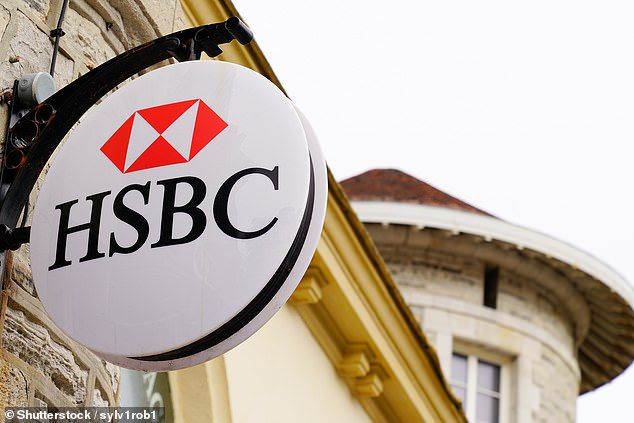Three more mortgage lenders have announced they are cutting mortgage rates, in another move to lower home borrowing costs.
Barclays, HSBC and Yorkshire Building Society have cut their rates, following Santander and Halifax earlier this week.
Yorkshire BS has cut its mortgage rates by up to 0.2 percentage points.
Down: HSBC is one of three lenders to cut mortgage rates
Rate changes from HSBC and Barclays mean they offer some of the lowest interest rates on the market.
HSBC is offering a five-year fixed rate of 4.39% to home remortgagers with at least 40% equity in their home. The deal comes with a £998 fee.
For those purchasing with a 25 per cent deposit, HSBC is now offering the lowest rate on the market.
Its five-year fixed rate of 4.37% carries a fee of £649. Someone buying a £200,000 mortgage repaid over 25 years will pay £1,099 a month with this HSBC product.
Given that the average five-year interest rate is 5.51 per cent, that represents a monthly saving of £130.
Barclays also offers a range of competitive deals, with five-year fixed rates starting at 4.23 per cent and two-year rates starting at 4.68 per cent.
The changes to Yorkshire BS, while not as dramatic, are aimed at both buyers and homeowners.
Homeowners with 25 per cent equity in their home, who remortgage to a five-year fixed term with Yorkshire BS, can now get a rate of 4.69 per cent with a fee of £495, down from 4.89 per cent previously.
And homebuyers with a 25 per cent deposit can secure a two-year fix at 4.89 per cent with a fee of £1,495, down from 4.99 per cent.
Mortgage rates have been falling since their peak in the summer of 2023, when they reached 6.86 percent with a two-year fixed term and 6.35 percent with a five-year fixed term.
The cuts have accelerated in recent weeks and the average two-year fixed mortgage rate today is 5.93 percent, while the average five-year fixed mortgage rate today is 5.51 percent.
Stephen Perkins, managing director of Yellow Brick Mortgages, told Newspage: ‘Two other major banks are competing to offer the cheapest mortgage rates, in the hope that borrowers will vote for them as their preferred lender.
‘The fact that HSBC and Barclays have announced rate cuts for Friday, following on from Santander, Natwest and Halifax earlier in the week, is starting to give a real boost to the mortgage market.’
Ranald Mitchell, director of Charwin Mortgages, sees things a little more dramatically.
He added: “This is not just another rate cut: it is a declaration of war that we expect to continue for the foreseeable future.”
‘Both lenders are fine-tuning their strategies, ready to lead the charge and outpace the competition.
‘While battles are rarely applauded, many homebuyers and mortgage holders are hoping this one will become a full-blown campaign, bringing with it significant benefits.’
Why are mortgage rates falling?
Mortgage rates are falling due to changing expectations about future interest rates. Market interest rate expectations are reflected in swap rates.
These swaps are influenced by long-term market projections for the Bank of England base rate, as well as the broader economy, internal bank targets and competitors’ pricing.
As of July 2, two-year swaps are at 4.48 percent and five-year swaps are at 3.98 percent.
This figure represents a decrease from a month ago, when two-year swaps were at 4.61 percent and five-year swaps were at 4.05 percent.
Nicholas Mendes, mortgage technical manager at broker John Charcol, believes swaps are not the only factor influencing rate cuts at the moment.
He believes the lack of activity in the mortgage market is also prompting lenders to try to attract new business.
Mendes says he expects the rate war to continue for two more weeks before another pause occurs.
He said: ‘Since the general election was called, the swaps market has seen only marginal declines, but there has been a drop in activity as prospective buyers await further government incentives such as higher stamp duty thresholds or more choice for first-time buyers.
Lenders have also delayed reductions, aiming to balance potential volatility in swaps.
‘As a result, lenders have held rates longer than preferred and are now readjusting them as the election concludes.
‘These factors have led to a decline in mortgage purchase and refinancing activity, and lenders are trying to make up for lost time by capturing as much market share as possible.
‘Despite the absence of a reduction in the bank rate, there is scope for reductions.
“We can expect about two weeks of price adjustment before a pause, as lenders adjust their margins to appropriate levels. However, some traditional lenders may continue to compete for volume.”
Some links in this article may be affiliate links. If you click on them we may earn a small commission. This helps us fund This Is Money and keep it free to use. We do not write articles to promote products. We do not allow any commercial relationships to affect our editorial independence.



